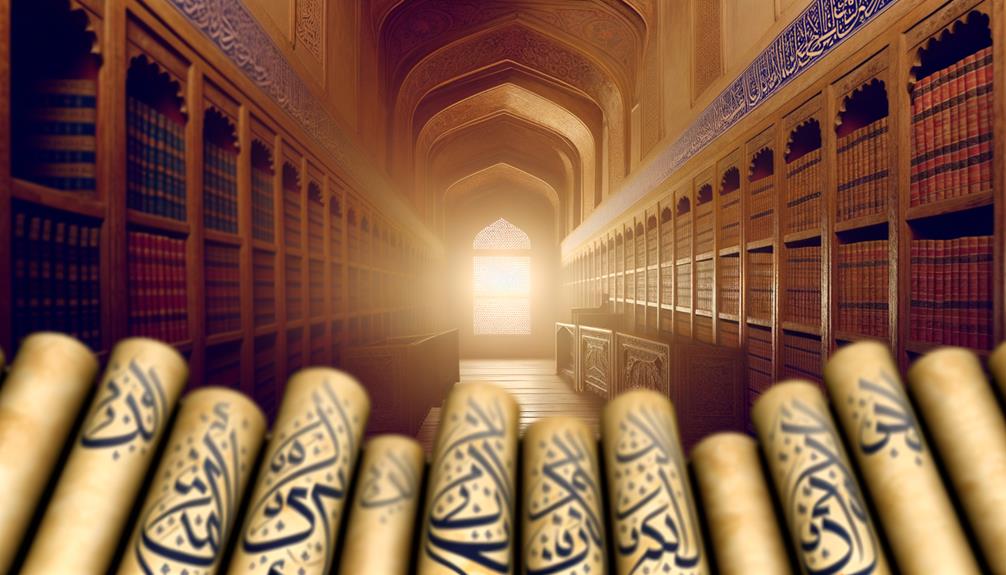Name Imran Meaning in Urdu
The name Imran, written as عمران in Urdu, carries immense cultural and religious significance. Derived from the Arabic root 'a-m-r', it means prosperity.
Imran is revered in Islamic tradition, particularly as the grandfather of Prophet Isa (Jesus) and the father of Maryam (Mary). This name symbolizes piety, leadership, and integrity.
Across Middle Eastern, South Asian, and North African cultures, Imran is prevalent in naming ceremonies and literary works. Embracing this name reflects a commitment to spiritual values and a rich historical lineage.
Explore more to understand its deep-rooted importance in various contexts.

Key Takeaways
- Imran means 'prosperity' in Urdu, derived from the Arabic root 'a-m-r'.
- The name Imran holds significant religious reverence in Islamic tradition.
- Imran is associated with piety, wisdom, and respect in Urdu-speaking cultures.
- Imran is the name of the grandfather of Prophet Isa (Jesus) in Islamic narratives.
- The name Imran is celebrated for its spiritual and cultural importance in Urdu.
Historical Background
Tracing the historical background of the name Imran reveals its deep roots in Islamic tradition and Arabic culture. You'll find that Imran is significant in both religious texts and historical narratives.
In Islamic tradition, Imran is revered as the father of Maryam (Mary), making him the grandfather of Prophet Isa (Jesus). This connection underscores the name's profound spiritual significance. Additionally, the name appears in the Quran, adding a layer of religious reverence.
Historically, Imran has been a popular name among Muslims, symbolizing piety and respect. Understanding its historical context helps you appreciate its lasting cultural and religious importance, reflecting values that have been cherished for centuries.
This rich history adds depth to the name's meaning, especially in Urdu-speaking communities.
Linguistic Roots
The linguistic roots of the name Imran are deeply embedded in the Arabic language, offering a nuanced understanding of its meaning and cultural resonance.
When you explore its etymology, you'll find that Imran, written as عمران in Arabic, stems from the triliteral root ‘a-m-r, which connotes prosperity and longevity. This root is foundational in various Arabic words, enriching the name with layers of significance.
Additionally, Imran is a name that carries historical and religious weight, particularly within Islamic traditions. By understanding its linguistic origins, you're better equipped to appreciate its depth and the context in which it's used.
The name's Arabic roots make it resonate profoundly in cultures influenced by the language.
Cultural Significance
Imran carries immense cultural significance, prominently reverberating through Islamic traditions and historical narratives. In various cultures, the name Imran encapsulates values of leadership, wisdom, and integrity. You'll find it prevalent in regions influenced by Islamic civilization, illustrating its deep-rooted heritage.
| Region | Historical Influence | Cultural Practices |
|---|---|---|
| Middle East | Early Islamic Empires | Naming ceremonies, literary works |
| South Asia | Mughal Era, Sufism | Poetry, folklore, and music |
| North Africa | Arab Conquest, Berber Culture | Oral traditions, community events |
Understanding Imran's cultural weight helps you appreciate its lasting impact across generations. This name doesn't just represent an individual but embodies a shared cultural and historical legacy.
Religious Importance
Rooted in the Quran and Islamic tradition, Imran holds profound religious significance, symbolizing faith and piety. Imran is the name of a revered prophet in Islam, mentioned prominently in the Quran. He's celebrated as the father of Maryam (Mary), who's the mother of Prophet Isa (Jesus).
By naming someone Imran, you're invoking a lineage of deep spiritual devotion and adherence to divine commandments. The Quranic chapters Al-Imran and Maryam emphasize his family's virtues, underscoring their exemplary faith.
Embracing this name doesn't merely reflect cultural heritage but also a commitment to spiritual values. It carries a sense of reverence, reminding one of a legacy rooted in unwavering belief and righteousness.
Modern Usage
In contemporary times, the name Imran continues to hold significant cultural and spiritual weight, seamlessly blending its rich religious heritage with modern identity. You'll find the name Imran used widely across various cultures and communities, particularly in Muslim-majority countries. It's a name that resonates with historical reverence yet fits comfortably within modern societal contexts.
Parents today choose Imran not just for its religious significance but also for its timeless appeal and meaningful connotations. In Urdu-speaking regions, the name’s elegant script and phonetic beauty add another layer of attraction. Therefore, the name Imran serves as a bridge between past and present, encapsulating both tradition and contemporary relevance in a single, profound identity. Furthermore, the name Imran holds special significance for many Muslim families as it is the name of the father of the Virgin Mary in Islamic tradition. This adds a deep spiritual and historical resonance to the name, making it a popular choice for parents looking for a name with strong cultural roots. In fact, when searching for meaningful baby names, many parents are drawn to Imran due to its rich aayat name meaning in Urdu, further cementing its appeal in the hearts of many.
Conclusion
Just imagine, as you explore the name Imran, you're not merely discovering a word but revealing a tapestry woven with history, culture, and faith.
With roots deep in linguistics and profound religious significance, Imran isn't just a name—it's a journey through time and tradition.
So, what modern role does this ancient name play? That, dear reader, is a mystery you'll uncover as you investigate deeper into its rich legacy.






